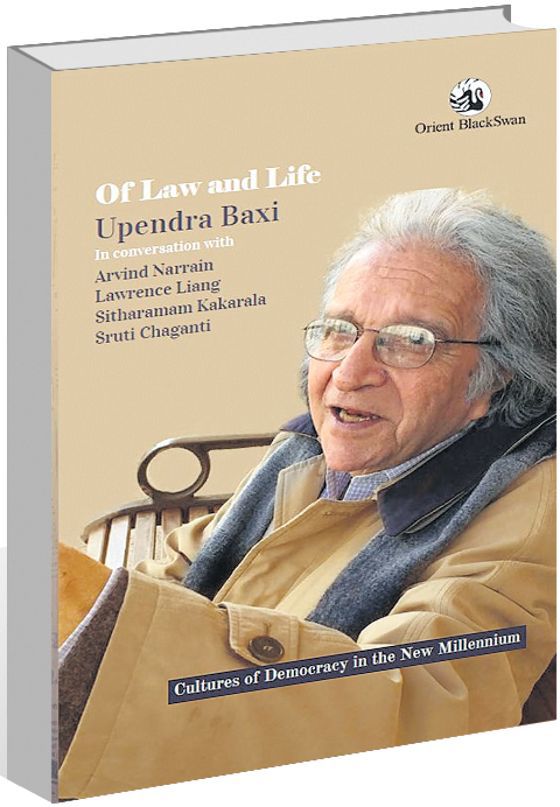Of Law and Life Upendra Baxi in conversation with Arvind Narrain, Lawrence Liang, Sitharamam Kakarala and Sruti Chaganti. Orient BlackSwan. Pages 618. Rs 2,310
Book Title:
Ranbir Singh
Ajourney into the life and intellectual legacy of Upendra Baxi, ‘Of Law and Life...’ departs from conventional biographical narratives, opting instead for an introspective exploration of Baxi’s life through his own reflections. This distinctive approach transports us to Baxi’s experiences with law and life, while taking us through various monumental moments in India’s legal history.
The book begins by introducing us to Baxi’s approach to reading and learning, that goes beyond a mere academic exercise; it is a transformative experience that shapes his entire worldview. This commitment to learning sheds light on his lifelong dedication to using the law as a tool for social transformation, particularly through merging legal theory and praxis with legal activism. Teaching, for Baxi, is not just a profession, but an act of sacrifice and commitment.
His teaching philosophy reflects his deep-seated belief in the power of knowledge and education. The book has insights into the thought process behind his writings, which provide a foundational framework for understanding legal activism, including its strategies, ethical dilemmas, and its critical role in shaping legal cultures.
The exploration of ‘Law in Context’ brings us to Baxi’s interdisciplinary approach, unravelling the complexities of legal theory and praxis. The book unfolds as a captivating legal quest, tracing Baxi’s intellectual evolution from his early encounters with Roscoe Pound to Angela Davis, during his formative years at Berkeley. His experiences in Australia teach us about the evolution of indigenous people’s jurisprudence, which later on had a grave impact in Baxi’s theoretical contributions to human rights, right to development, and his engagements with diverse legal traditions and jurisprudence.
The book unfolds a series of conversations held over two weeks, presented across 15 chapters. Each chapter serves as a portal into the post-colonial evolution of Indian jurisprudence, drawing from Baxi’s experiences. These conversations are rich with anecdotes, philosophical reflections, literary references and theoretical insights. Baxi’s deep commitment to social causes, evident in his early opposition to the Vietnam war, not only shaped his worldview, but also fuelled a lifelong dedication to social justice.
The relevance of Baxi’s experiences with the law in contemporary times is particularly striking, especially in the context of legal education. Today, as we confront complex socio-political and constitutional challenges, Baxi’s approach serves as a poignant reminder of the role of legal education in the socio-political development of a State.
Baxi’s contributions to legal education, notably during his tenure as Vice-Chancellor at Delhi University and in establishing National Law Schools, highlight his vision of nurturing a generation of lawyers who are not only legally proficient, but also understand the complexities of society through its history and socio-political movements.
Moreover, Baxi’s journey as an activist and legal thinker highlights the interconnectedness of theory and practice. His experiences in social activism inform his academic work, providing a real-world context to his theoretical insights. This synergy between theory and practice is crucial for bridging the gap between legal education and social activism, ensuring that legal professionals are equipped not only with legal expertise, but also with a sense of socio-political responsibility.
In the latter part of the book, an examination of Upendra Baxi’s theoretical contributions to constitutionalism unfolds. His categorisation of seven distinct types of constitutions and delineation of three forms of constitutionalism not only demonstrate his constant yearning for intellectual rigour, but also reveal the deep emotional and personal investment he has in the subject.
Narrain and Baxi delve into Social Action Litigation (SAL) within the Indian context, engaging with the complexities of its appropriation by the middle classes amidst globalisation. SAL, as conceptualised by Baxi, represents a unique form of legal activism that transcends traditional legal boundaries to engage with broader social issues. Baxi posits SAL as a transformative tool that serves dual purposes: as a means of judicial intervention to address immediate injustices, while also functioning as a catalyst for long-term societal change.
In the last part of the book, Baxi and Sitharamam Kakarala discuss human rights as a traditional legal discourse, delving into its philosophical and ethical dimensions. His critical examination of human rights essentialism challenges simplistic interpretations. Furthermore, Baxi’s critique of legal theory, often rooted in western perspectives, is a pivotal aspect of his work. His work not only expands our understanding of human rights and legal theory, but also challenges us to think critically about their application through notions of universalism.
Baxi argues that jurisprudence, as the study of law, should be inherent in all legal education, rather than a separate course. He criticises the theory-practice divide in India, contrasting it with the US’ approach, “where jurisprudence is integrated into legal education as a policy science”. Baxi advocates an approach that does not “ghettoise human rights”, but incorporates it into the broader legal curriculum, enriching students’ understanding and encouraging a more critical engagement with the human rights discourse.
A distinctly notable conversation in the book is Baxi’s reverence for Dr BR Ambedkar, whose writings he perceives as an enduring fount of learning. His immersion in Ambedkar’s examination of structural violence within Indian society grounds his conviction in the law’s efficacy as a potent tool for dismantling deep-seated injustices. The engagement serves as a reminder of the acknowledgment of Ambedkar within Indian legal thought and the neglect of his writings in the pedagogy of law students.
‘Of Law and Life...’ compels readers to critically re-think the post-colonial legal framework and envision its future by delving into Baxi’s memories, writings and contributions. As students and practitioners of law, we are prompted to reflect on the complexities of the legal system and to redefine its role in contemporary India. Baxi’s insights also urge us to critically examine legal education and legal development.














